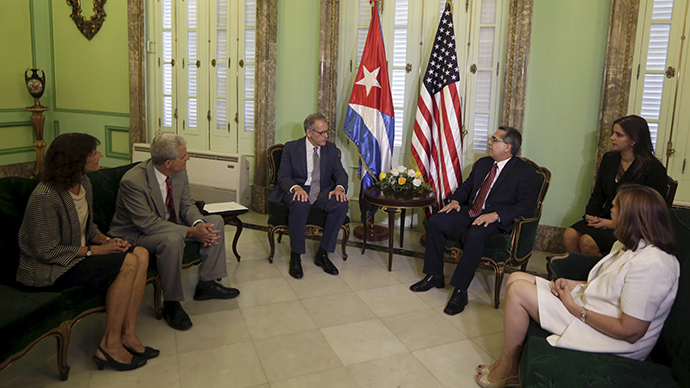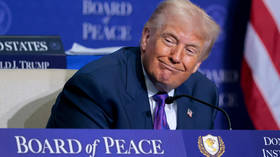‘US employs Trojan horse strategy with Cuba’

The US restoring diplomatic relations with Cuba is a Trojan horse strategy which is set to mask Washington’s intentions to re-colonize Cuba, tap into its market and return it to neo-colony status, says political analyst Daniel Shaw.
The US and Cuba could open embassies in each other's capitals as early as July 20. The move might seem like the start of a new era for the two countries, but there are still plenty of potential stumbling blocks. Cuba is demanding that Washington returned the territory it leases for the Guantanamo Bay military base and detention center. But the US has said that will not happen.
RT:What kind of relationship does the US hope to develop with Cuba?
Daniel Shaw: If the US was truly sincere about respecting Cuban sovereignty and human rights, they would first return Guantanamo Bay to the Cuban people, to the Cuban government where it belongs. It’s an incredible double standard that we would expect any sovereign country to allow US bases on their territory. We could imagine for a second that Cuba would insist upon having any type of military base outside of Cuba in Florida or anywhere in the US. So there are still a number of stumbling blocks to have truly reciprocal, respectful relations between the two countries.
RT:Could this decision affect the status of Guantanamo Bay which Cuba still considers to be illegally occupied?
DS: The Cuban leadership has put that on the table front and center, and President Obama has refused to even engage that question. The US has always used this human right discourse and flipped it on its head, when the US is continually violating the human rights of the Palestinian people and the Iraqi people and in other countries that are occupied by the US military. They continually use this against Cuba, Venezuela, against any ‘regime’ that doesn’t serve their interests.
READ MORE: Cuba, US to open embassies on/after July 20 at end of 50-year stalemate
RT:What are the prospects for lifting the more than 50-year US embargo on Cuba?
DS: It sounds like the US Congress is not even considering this. The blockade against the Cuban people has been incredibly severe and cruel. It’s cost the Cuban economy billions of dollars. We believe in the Answer Coalition movement that the US owes the Cuban people reparations for these damages. It’s amounted to an economic war; it’s created a lot of scarcity which is its very intention. They feel like they can blockade and suffocate the Cuban people, they create a lot of internal political strive which will then have a backlash against the Cuban government. This plan has backfired, so now they are employing their latest strategy which comes in the form of open friendly diplomatic relations when it’s really just Trojan horse type of strategy trying to mask their true intentions of re-colonizing Cuba, of tapping into the Cuban market and returning Cuba to a status that it had before 1959 as a neo-colony of the US.
RT:But is there at least some good news for the Cuban economy, after years of isolation?
DS: Certainly there is some good news. It showed that the Cuban people stood firm when the entire capitalist world is aggressively surrounding Cuba and wanting to break them, the people went through incredible sacrifices specifically in 1991 when a special period began. I think as Americans we can’t begin to comprehend what the Cuban people were faced to endure solely because their government and their representatives decided on a different political and economic system which the US didn’t approve of. But certainly there is a reason to be very happy but also to realize that the struggle is not over.
The statements, views and opinions expressed in this column are solely those of the author and do not necessarily represent those of RT.
The statements, views and opinions expressed in this column are solely those of the author and do not necessarily represent those of RT.












